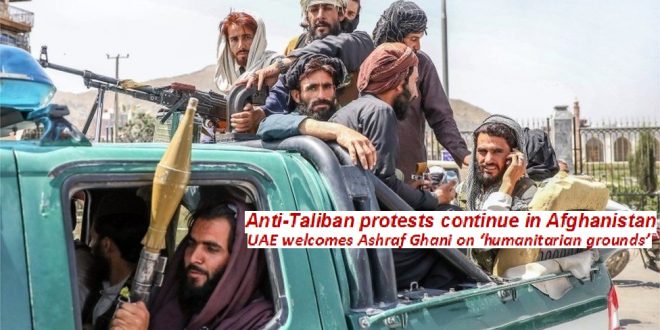18-08-2021
By SJA Jafri + BBC
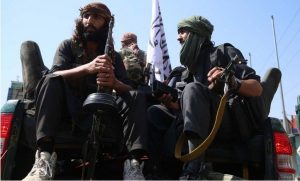 KABUL/ NEW DELHI/ ISLAMABAD: The Taliban’s blisteringly fast takeover of Afghanistan has stunned security and diplomacy experts worldwide. Days after the fall of Kabul, nations are hurriedly evacuating their diplomats and citizens, leaving behind two decades of work and investments.
KABUL/ NEW DELHI/ ISLAMABAD: The Taliban’s blisteringly fast takeover of Afghanistan has stunned security and diplomacy experts worldwide. Days after the fall of Kabul, nations are hurriedly evacuating their diplomats and citizens, leaving behind two decades of work and investments.
The Taliban’s rout is likely to cause a significant shift in the geopolitics of South Asia, and it could be particularly testing for India, given the country’s historically tense relations and border dispute with Pakistan and China- both are expected to play a crucial role in Afghanistan’s future.
Pakistan shares a porous border with Afghanistan and has long been an active player in its northern neighbor’s affairs. Now China is showing an interest in playing a bigger role in Afghanistan. Foreign minister Wang Yi’s meeting with senior Taliban leaders last month shows Beijing doesn’t want to be a silent player anymore.
This potential geopolitical realignment could “change things upside down”, said Gautam Mukhopadhaya, India’s former ambassador to Afghanistan and Syria.
Afghanistan was a loose alliance between the democratic government in Kabul, the West and other democracies like India. But the world is likely to see Pakistan, Russia, Iran and China coming together to play the next chapter of the Great Game.
Some in India see this as a loss for Delhi and a big win for Pakistan. But former Indian diplomat Jitendra Nath Misra said that was too simplistic a view, because the Pahstun-led Taliban has never recognized the border between Afghanistan and Pakistan, creating discomfort for Islamabad.
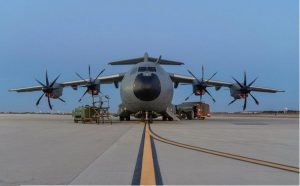 “Pakistan would want to get the Taliban to accept the border and this will be a top priority,” but it’s also true that the Taliban’s rule in Afghanistan gives Pakistan strategic depth against India. Islamabad has gotten what it always wanted, said Michael Kugelman, deputy director of the Wilson Center think-tank in Washington, a government in Afghanistan that it can easily influence, he said.
“Pakistan would want to get the Taliban to accept the border and this will be a top priority,” but it’s also true that the Taliban’s rule in Afghanistan gives Pakistan strategic depth against India. Islamabad has gotten what it always wanted, said Michael Kugelman, deputy director of the Wilson Center think-tank in Washington, a government in Afghanistan that it can easily influence, he said.
“Pakistani officials may show this off as India’s loss, but then there are bigger strategic goals for Pakistan,” Kugelman said. “It really sees itself as the biggest regional winner at the moment.”
Experts say Pakistan was not happy with the growing ties between the US and India, or former Afghan president Ashraf Ghani’s lukewarm relations with Islamabad. The country’s struggling economy also made it feel vulnerable.
Now Islamabad has reasons to believe that it’s the winner because its “all-weather” friendship with China will be useful in Afghanistan. Moreover, Beijing is not shy of showing its might anymore. “China can and will play the game now according to its own rules,” Misra said.
China also has economic interests in Afghanistan, which can help fulfil its ever-growing need for minerals, but more importantly it can pressure the Taliban to ban the East Turkestan Islamic Movement (ETIM), which it blames for unrest in its Muslim-dominated Xinjian province, to operate on Afghan soil.
Mukhopadhaya said China and Pakistan “would ride piggyback on each other in Afghanistan”. But he added that Beijing should be cautious and not fall into any trap like other world powers in the past.
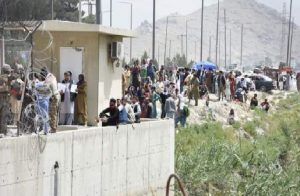 Russia and Iran also seem to be on the same trajectory – neither has evacuated its embassy, and both nations’ diplomats are still working in Kabul.
Russia and Iran also seem to be on the same trajectory – neither has evacuated its embassy, and both nations’ diplomats are still working in Kabul.
So, what can India do now? The country was never as big a player in Afghanistan as Pakistan, the US or Russia. But Delhi has always been involved in promoting security and cultural ties. Thousands of Afghans are in India for education, work or medical treatment.
Misra says there are no good options for Delhi. “There are bad and then there are worse options,” he said.
The biggest challenge India will face is whether to recognize the Taliban government or not. The decision will get tough, especially if Moscow and Beijing decide to acknowledge the Taliban government in some form. Experts say Islamabad is likely to officially accept the Taliban government, as it did in 1999.
India’s best option at the moment seems to keep a channel of communication open with the Taliban. But it will be an uneasy relationship, considering the history between the Taliban and Delhi. The Taliban gave a safe passage to the hijackers of an Indian Airlines plane in 1999, an incident that remains etched in the collective memory of Indians. And Delhi has always kept close ties with the Northern Alliance – a group of Afghan warlords that fought the Taliban between 1996 and 1999.
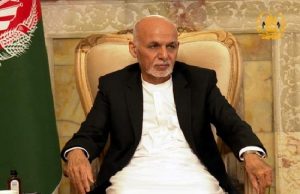 With the Taliban in the heart of Kabul, India may now wish to put the past to one side in order to safeguard its own interests, and to ensure the region remains stable. There are concerns that militant groups like the Jaish-e-Mohammad Lashkar-e-Taiba will be galvanized by the Taliban’s success and plan and execute attacks against India.
With the Taliban in the heart of Kabul, India may now wish to put the past to one side in order to safeguard its own interests, and to ensure the region remains stable. There are concerns that militant groups like the Jaish-e-Mohammad Lashkar-e-Taiba will be galvanized by the Taliban’s success and plan and execute attacks against India.
Amalendu Misra, a professor of politics at Lancaster University and the author of a book on Afghanistan, says it’s a diplomatic tightrope India will have to walk and it may need a strategy to ensure that the contested region of Kashmir doesn’t become the next rallying point for the mujahideen.
While experts say India needs to keep talking to the Taliban, it will have to decide how much it may want to get involved in any anti-Taliban groupings. The West is likely to form a united front to keep pressure on the Taliban. British PM Boris Johnson has already called for a joint response to the Taliban government.
Then there are other possibilities, like the Northern Alliance regrouping later, or Afghanistan becoming another place for a fight for supremacy between the US-led West and a joint group of China, Russia and Pakistan.
So there are no easy options for India, but its decisions will have consequences on regional peace and global geopolitics.
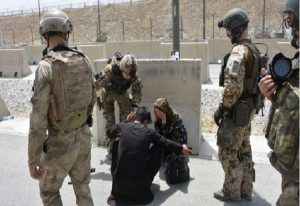 Meanwhile, the United Arab Emirates (UAE) Ministry of Foreign Affairs on Wednesday said that it has welcomed ousted Afghan president Ashraf Ghani and his family into the country.
Meanwhile, the United Arab Emirates (UAE) Ministry of Foreign Affairs on Wednesday said that it has welcomed ousted Afghan president Ashraf Ghani and his family into the country.
“The UAE Ministry of Foreign Affairs and International Cooperation can confirm that the UAE has welcomed President Ashraf Ghani and his family into the country on humanitarian grounds,” read a brief statement on the ministry’s website.
Ghani’s whereabouts have been the subject of much speculation since he fled from Afghanistan on Sunday, as the Taliban entered capital Kabul in the final stage to wrap up a 10-day lightning offensive across the country.
On Sunday, a senior Interior Ministry official said Ghani had left for Tajikistan. A Foreign Ministry official said his location was unknown and the Taliban said it was checking his whereabouts.
Meanwhile, foreign media reports on Afghanistan contacting the Interpol and asking it to arrest Ghani began to surface earlier today.
According to Forbes, the Afghan embassy in Tajikistan made the demand on charges of Ghani “stealing from the country’s treasury”.
It has also demanded the arrest of former Afghan National Security Advisor Hamdullah Mohib and Ghani’s Chief Advisor Fazel Mahmood, Tolo News said, quoting sources.
Ghani fled with cars and helicopter full of cash
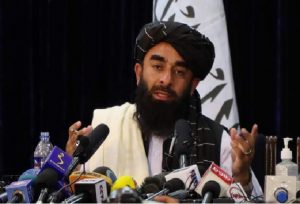 Russia’s embassy in Kabul on Monday said that Ghani had fled the country with four cars and a helicopter full of cash and had to leave some money behind as it would not all fit in, the RIA news agency reported.
Russia’s embassy in Kabul on Monday said that Ghani had fled the country with four cars and a helicopter full of cash and had to leave some money behind as it would not all fit in, the RIA news agency reported.
Russia has said it will retain a diplomatic presence in Kabul and hopes to develop ties with the Taliban even as it says it is no rush to recognize them as the country’s rulers and will closely observe their behavior.
“As for the collapse of the (outgoing) regime, it is most eloquently characterized by the way Ghani fled Afghanistan,” Nikita Ishchenko, a spokesman for the Russian embassy in Kabul, was quoted as saying by RIA.
“Four cars were full of money, they tried to stuff another part of the money into a helicopter, but not all of it fit. And some of the money was left lying on the tarmac,” he was quoted as saying.
Ischenko, the Russian embassy spokesman, confirmed his comments to Reuters. He cited “witnesses” as the source of his information. Reuters could not independently confirm the veracity of his account immediately.
President Vladimir Putin’s special representative on Afghanistan Zamir Kabulov said earlier it was unclear how much money the fleeing government would leave behind.
“I hope the government that has fled did not take all the money from the state budget. It will be the bedrock of the budget if something is left,” Kabulov told Moscow’s Ekho Moskvy radio station.
 Pressmediaofindia
Pressmediaofindia
